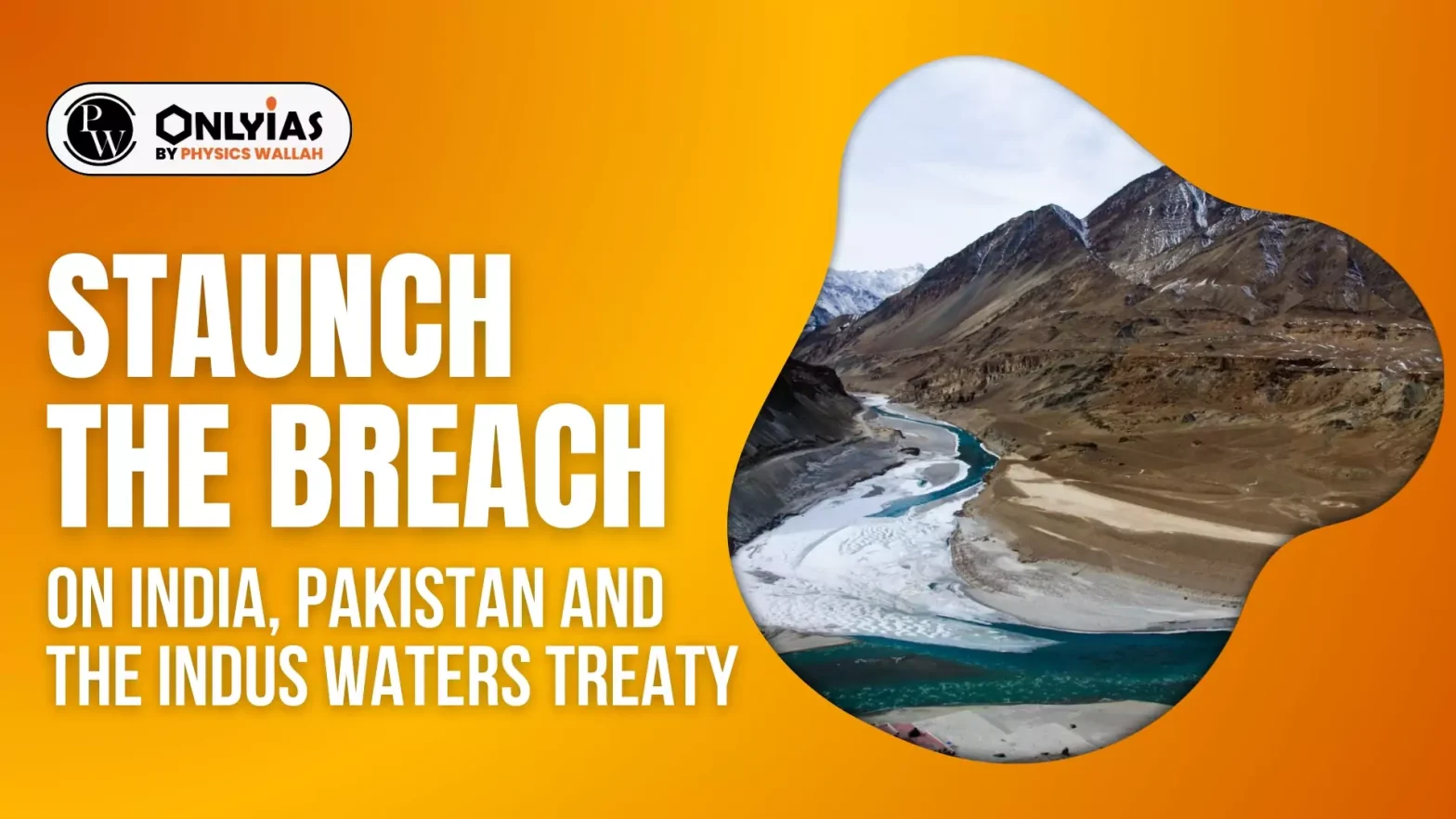India has escalated its demand for renegotiation of the 1960 Indus Waters Treaty (IWT), halting meetings of the Permanent Indus Commission until Pakistan agrees to engage in discussions. This situation marks a significant shift in the historically cooperative framework established by the treaty, reflecting broader tensions in India-Pakistan relations.
The Indus Waters Treaty (IWT)
The distribution of waters from the Indus River and its tributaries between India and Pakistan is governed by the Indus Waters Treaty (IWT), signed in 1960 with the mediation of the World Bank.
- Following the Partition of India, it was essential to divide water resources equitably. The Indus Waters Treaty (IWT) was established to address this need, stipulating that Pakistan would receive the major share of water from the western rivers—Chenab, Jhelum, and Indus—accounting for approximately 80% of the total flow and 20% to India. Conversely, India was allocated exclusive rights over the eastern rivers—Sutlej, Beas, and Ravi.
- To resolve any potential disputes, the treaty mandated the establishment of a Permanent Indus Commission (PIC), composed of commissioners from both countries, which would meet at least once a year.
- Resolution of conflict: If conflicts arose, the PIC would first attempt to mediate. If PIC fails, a neutral expert appointed by the World Bank would intervene. If the neutral expert’s efforts also proved inadequate, the final recourse would be to establish a Court of Arbitration to settle the disputes. This structured approach aimed to foster cooperation and manage the complex water-sharing relationship between India and Pakistan.
Enroll now for UPSC Online Course
Nature of the Indus Waters Treaty
- The Indus Waters Treaty (IWT) was generous from India’s side, as being the upper riparian state, India could have claimed more water. However, India agreed to allocate a major share of water to Pakistan, with 80% of the water from the western rivers (Indus, Chenab, Jhelum) going to Pakistan.
- Such an example of an upper riparian state conceding significant water rights to a lower riparian state is rare globally.
- U.S. President Dwight D. Eisenhower once referred to the IWT as “the one bright spot in a very depressing world picture.” Despite challenges, it has remained a successful agreement since its inception in 1960.
Major Disputes
- Baglihar Dam Dispute: Pakistan objected to India’s construction of the Baglihar hydroelectric project on the Chenab River, fearing India could control water flow. The Court of Arbitration ruled mostly in India’s favor.
- Neelum Project Dispute: Pakistan accused India of obstructing the Kishanganga River’s flow, affecting Pakistan’s Neelum-Jhelum Hydropower Project. The dispute was later resolved.
- Ratle project and the Kishanganga dispute: The disputes emerged from India’s construction of the Ratle hydroelectric plant on the Chenab River. This project was classified as a “run-of-the-river” initiative, utilising the natural flow of water to generate electricity. However, Pakistan contended that this development violated the Indus Waters Treaty (IWT).
- The Permanent Indus Commission (PIC), established to address such disputes, was unable to resolve the contention. In response, India proposed appointing a neutral expert to evaluate the situation in accordance with the treaty’s dispute resolution mechanism. Conversely, Pakistan rejected this option, insisting on escalating the matter to the Permanent Court of Arbitration (PCA) instead. This insistence on arbitration without first seeking the neutral expert was perceived as a deviation from the agreed-upon protocols of the treaty.
- In a contentious decision, the World Bank permitted both dispute resolution processes—India’s call for a neutral expert and Pakistan’s request for PCA arbitration—to proceed simultaneously. This dual approach escalated the tensions between India and Pakistan, complicating the resolution of the issue.
Check Out UPSC Modules From PW Store
Current Scenario
- In its fourth notice to Pakistan since January 2023, India has escalated its demand for the renegotiation of the Indus Waters Treaty (IWT), suspending all meetings of the Permanent Indus Commission (PIC). This decision followed a prolonged deadlock in the dispute resolution process between the two nations.
- Historically, even amidst disputes, the IWT remained a relatively stable agreement. However, recent tensions have transformed the treaty into a contentious issue.
- Following the Uri attack, Prime Minister Modi’s declaration that “blood and water cannot flow together” has cast a shadow over the treaty’s integrity.
- Currently, the situation is dire, with no political engagement and trade disengagement between the two countries. Even the 2021 Line of Control (LoC) ceasefire agreement is now at risk due to a resurgence of terror attacks and increasing casualties among Indian Army personnel.
- India accuses Pakistan of continuing to support terrorist organisations, raising questions about the need for maintaining the ceasefire under such circumstances.
Conclusion
The challenge now is not merely the reopening of the treaty for renegotiation, but rather finding common ground in today’s polarised environment, which appears nearly impossible. Previously, India adopted a more conciliatory approach towards the IWT, recognizing its importance. However, with climate change impacting water resources and the growing necessity for renewable solutions, revisiting the treaty has become essential, though it comes with significant challenges. The potential for negotiation hinges on both nations’ willingness to collaborate on mutual water management strategies for the future.
Enroll now for UPSC Online Classes
![]() 21 Sep 2024
21 Sep 2024

